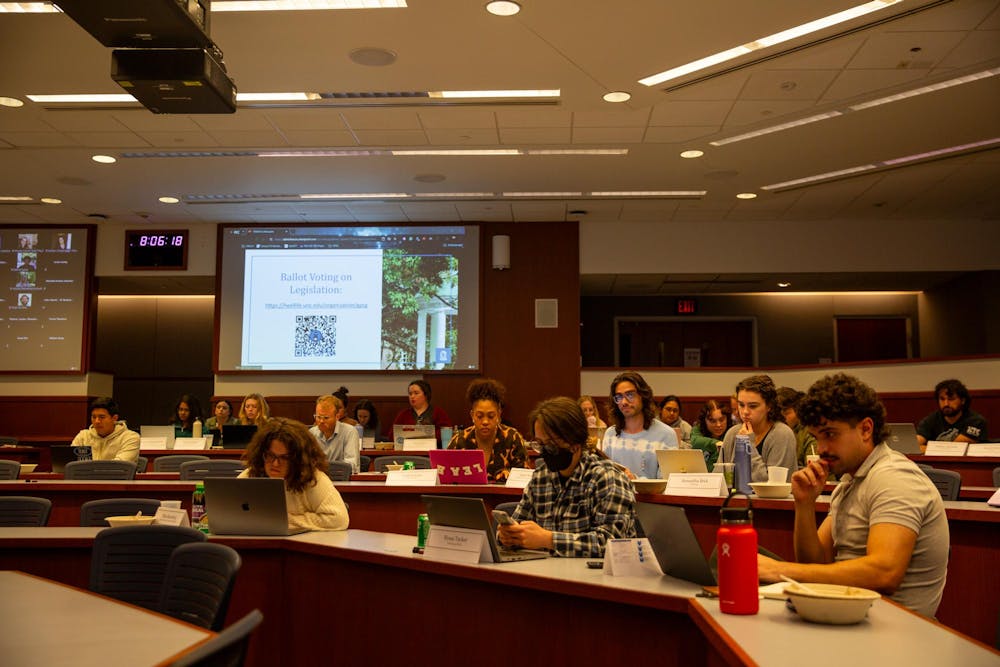“It is unreasonable to suggest that the Board failing to respond to an email request in 24-48 hours infringes on a constitutional right,” the ruling states.
The ruling found that Tucker’s claim of being at a disadvantage was “unpersuasive” given that all candidates were expected to collect signatures under the same conditions. The court also emphasized that while the BOE is responsible for overseeing elections, it is not required to assist candidates in their campaigns.
As a result of the ruling, the GPSG presidential election was moved to Thursday, March 20, in conjunction with the GPSG elections.
BOE emergency meeting
On Friday March 21, the BOE held an emergency meeting to determine the appropriate penalty for the violation of GPSG code 5.003-1 (5b) by Tucker.
The code states that candidates are required to submit a campaign finance report by 5 p.m. on election day. Tucker submitted their finance report 91 minutes past the deadline and said their campaign spent zero dollars.
Acting BOE chair Elias North said that the law gives the BOE broad latitude within the GPSG code to apply sanctions to candidates who violate procedure.
According to GPSG code 8.004, minor violations include campaign material violations, location violations and minor misrepresentations or falsifications. Major violations include damage to campaign materials or University property, major misrepresentation or falsification of campaign, slander, libel, malicious campaigning, incentives, failure to comply with BOE directives and use of GPSG resources.
Avery Baker, GPSG senator representing public policy who worked on Tucker’s campaign, said there were no repeated or frequent violations during the campaign and was not notified of any violations after Tucker submitted their financial disclosure form.
Baker also expressed concerns that the emergency meeting "was not conducted in a transparent manner." She noted that voters were not adequately informed about the meeting, the unofficial election results or the potential impact of the BOE decision.
The voting members for this matter were North, BOE member Cormac Lynch and Keagan James, who was nominated and elected as vice chair during the meeting.
In an interview with The Daily Tar Heel, North said that the board received the late submission and proceeded with finishing tabulating the votes of the election at 2:15 a.m. on Friday. He added that he originally had written up a reprimand for Tucker but pivoted toward disqualification after learning of precedents from past cases, specifically a 1997 case, Kennedy v. Nelson, as well as interest from the board in other penalties.
To get the day's news and headlines in your inbox each morning, sign up for our email newsletters.
“The Graduate and Professional Student Government code very clearly set a 5 p.m. deadline on the day of the election, and then the other decision very clearly established what happens if that is not done, barring other statutory penalties in place, which there were not,” North said. “The GPSG code did not offer guidance on what penalties would be appropriate in this instance, so we defaulted to the common law precedent which was made when Student Government was one institution rather than two.”
A motion to issue a reprimand to Tucker by James failed due to lack of support. The subsequent motion to disqualify Tucker passed in a tie breaking vote cast by North.
James said his argument for reprimand was that the hour-and-a-half late submission was not substantial enough to warrant disqualification, especially given that the election itself had been delayed by an hour due to technical issues.
New lawsuit
On March 24, Tucker filed a second complaint against the BOE, claiming that the board had knowledge of the election outcome at the time of the emergency meeting and knowingly moved to disqualify them.
Tucker alleges that the board violated GPSG code because they did not issue a cease and desist directive prior to disqualifying the candidate. The lawsuit states the BOE "overreached in its application of the code."
Section 8.001 of the GPSG code states that the BOE has the power to "demand a campaign or candidate cease and desist clear violations of the campaign rules," and may disqualify a candidate or campaign if they do not comply. Section 8.004 of the code lists disqualification as an action the board may take against campaigns or candidates for any stated violation of the code.
Given that they received 310 votes — 67 percent of the 461 votes casted — Tucker demands to be instated as the duly elected GPSG president pending revocation of their disqualification.
Nathaniel Shue, chief justice of the Student Supreme Court, said the court recognizes that this has been an “extremely tumultuous” election and that a lot of individuals have serious stakes in the outcome. He said court will review the case as fast as humanly possible.
“There is a lot of volatility, a lot of moving parts, fast moving parts, and it is difficult to keep a handle on all of it, particularly for Student Government institutions,” Shue said.
Presidential-elect Leah Frazier said she does not feel it is appropriate for her to comment at this time.
“The BOE’s arbitrary actions were undemocratic and not grounded in the law of UNC Student Government election,” Tucker said in a statement. “They used their system to illegally motion to disqualify me. I trust the Student Supreme Court will honor the will of the people, or endanger casting our student government in the eye of the public as a sham.”
@calebherrera_
enterprisedesk@dailytarheel.com




